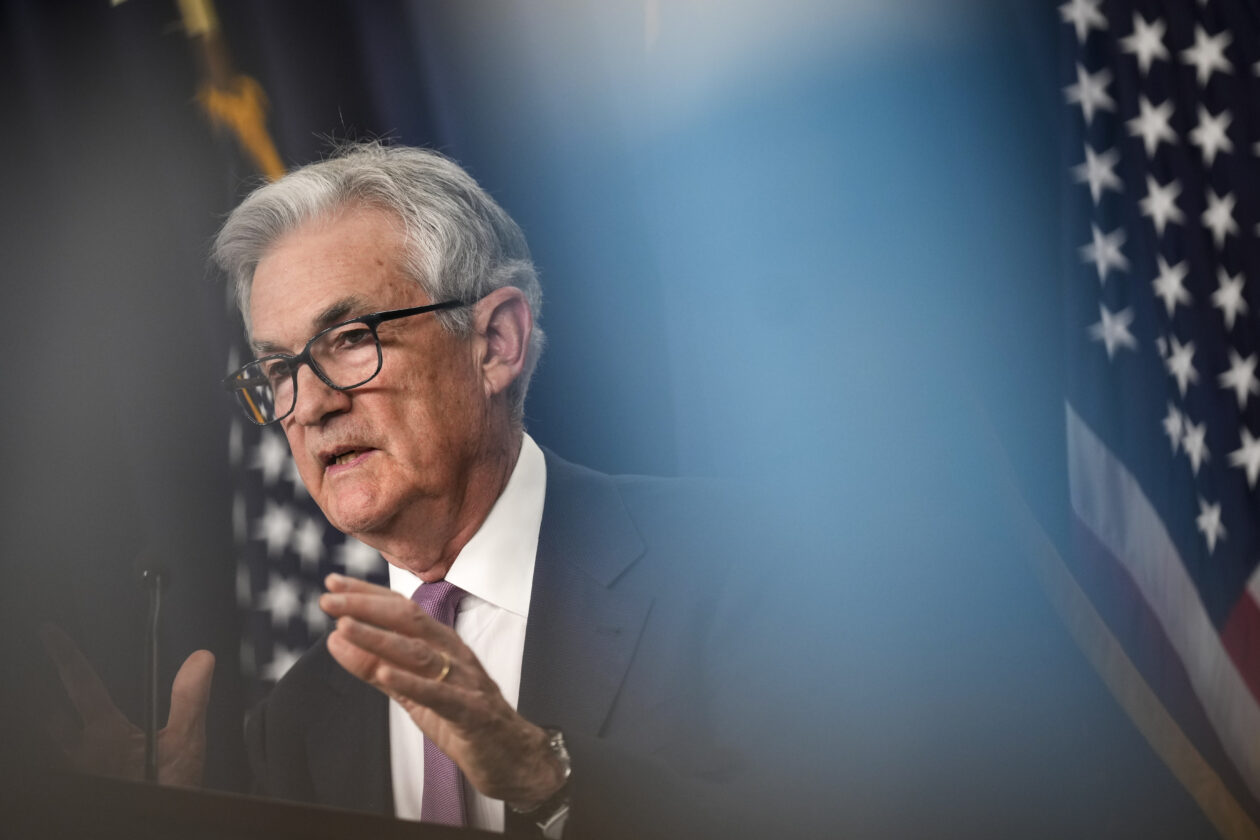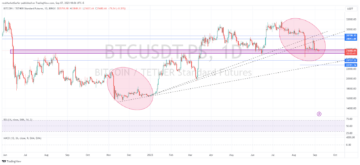Bitcoin and Ether fell on Thursday morning in Asia, along with other top 10 non-stablecoin cryptos. Bitcoin briefly dipped below $28,500, while Ether’s losses took it below the psychologically important $1,800 threshold. Smaller altcoins such as Dogecoin, Solana and Ripple suffered the biggest drops. In more bullish news, Coinbase Global received approval to offer crypto futures to U.S. retail investors. The Forkast 500 NFT Index was down, although market sentiment remains positive amid a prolonged increase in global transactions. U.S. equity futures traded mixed after another day of losses Wednesday. The release of the minutes for July’s Federal Reserve meeting on interest rates has cast a shadow over equities, the mood music now suggesting a prolonged period of elevated rates or even another hike.
Another down day for crypto
Bitcoin fell 0.95% in the last 24 hours to US$28,551.83 as of 9:00 a.m. in Hong Kong, after briefly falling below the $28,500 threshold earlier in the morning. The largest crypto by market capitalization logged a weekly loss of 3.51%, according to CoinMarketCap data.
Ether also lost 1.80% to US$1,794.91 — below the psychologically important $1,800 level — for a 3.28% drop in the past seven days.
All other top 10 non-stablecoin cryptocurrencies were down. Dogecoin was the biggest loser among the top 10, dropping 5.01% to US$0.06731 for a weekly loss of 10.07%. Solana followed in terms of losses, dipping 4.25% to US$22.83. The token fell 5.98% in the past week.
“Larger currencies have seen less pressure than smaller altcoins,” wrote Alex Kuptsikevich, senior market analyst at London-based online brokerage FxPro, in an emailed statement.
“Rising U.S. Treasury yields put pressure on riskier assets,” Kuptsikevich explained.
The losses arrive in the midst of more positive news for the crypto market.
On Wednesday, Coinbase Global — the largest cryptocurrency exchange in the U.S. — announced that it has received approval from the National Futures Association to offer crypto futures to U.S. retail investors. Previously, only institutional customers could trade crypto futures on the platform.
Coinbase called it a “watershed moment,” celebrating the win despite facing securities violation charges from the U.S. Securities and Exchange Commission (SEC).
“They now have an approved, compliant [Futures Commission Merchant status] and they understand the nuances of crypto markets,” wrote Chris Perkins, president and managing partner at New York-based investment advisor CoinFund.
“It’s an important step forward in cultivating deep, liquid derivative markets — which are very much needed. This should be very good for Coinbase, and excellent for crypto markets,” Perkins added.
Ripple’s XRP token also lost 3.66% to US$0.5862, posting a weekly loss of 8.08%. On July 13, Ripple appeared to score a victory in its ongoing legal battle with the SEC. A New York court ruled that the sale of XRP on public exchanges does not violate securities laws.
However, that aspect of the case is again under scrutiny as, on Aug. 9, the SEC asked for a review of the ruling — contributing to the downward pressure on XRP’s price.
The total crypto market capitalization moved down 1.47% in the past 24 hours to US$1.14 trillion, while trading volume rose 13.64% to US$33.76 billion.
Daily NFT transactions hit historic levels
The main Forkast 500 NFT index fell 0.76% in the past 24 hours to 2457.08 as of 08:45 a.m. in Hong Kong. The index shows a 1.23% loss for the week.
Forkast’s Ethereum, Solana and Cardano NFT indexes logged losses, while the index for Polygon gained.
Total NFT trading volume dipped 7.72% in the past 24 hours to US$15.01 million, according to data from CryptoSlam. Volumes on the Ethereum, Polygon and ImmutableX blockchains logged losses, while volume on Solana and Mythos gained.
On Wednesday, the total number of global NFT transactions reached a new milestone, marking an all-time high of 617,619, up from 595,209 on Tuesday.
“The NFT market is maturing right in front of us and we’re hitting historic levels on a daily basis,” said Yehudah Petscher, NFT strategist at Forkast Labs.
“Sales volume isn’t my measure for how healthy the NFT ecosystem is, it’s the buyers, sellers and it’s transactions,” said Petscher. “I am so bullish on NFTs right now.”
Much of that optimism, Petscher said, is based on a decline in NFT prices, with the average price of a single NFT now US$22.08, down from US37.85 a week earlier.
“Average sale prices, I want to point out again they continue to decline and that’s a very, very good thing. We want to bring in the masses. We want our friends and families to come into NFTs,” Petscher added.
DMarket, a collection linked to Mythos network-based blockchain games, topped the NFT collections chart by trade volume on CryptoSlam, adding 0.45% to US$970,811.
Ethereum-based DeGods came in second despite a 38.75% slump to US$922,882. The collection recently launched its “Season 3” collection update on Sunday. New-entry The Heist, an NFT collection based on the strategy game of the same name, placed third with a trade volume of US$756,980.
Fed minutes signpost potential hikes ahead


U.S. stock futures traded mixed as of 10:45 a.m. in Hong Kong following a decline across all three major indexes during regular trading Wednesday.
Wednesday’s release of the minutes from the U.S. Federal Reserve’s July meeting has put a dampener on investor sentiment. The discussion revealed concerns among Fed members that additional interest rate hikes may be needed to control inflation.
The minutes stated that “with inflation still well above the Committee’s longer-run goal and the labor market remaining tight, most participants continued to see significant upside risks to inflation, which could require further tightening of monetary policy.”
Following the release of the meeting minutes, analysts at the CME FedWatch Tool gave a 13.5% chance that the Federal Reserve will raise interest rates in September, up from 9.5% on Wednesday. The Fed meets on Sep. 19 to make its next move on interest rates, which are now between 5.25% to 5.50%, the highest level since January 2001.
The main stock indexes in Asia — China’s Shanghai Composite, Hong Kong’s Hang Seng, Japan’s Nikkei 225 and South Korea’s Kospi — all posted losses on Thursday morning, echoing bearish sentiment in the U.S.
The Shanghai Composite fell 0.15% to around 3,145, its lowest level since early January. That reading combined with weak economic data and the nation’s ongoing property sector debt crisis points to a downturn in the Chinese economy.
“Prolonged weakness in property construction will add to destocking pressures in the industrial space and depress consumption demand as well,” said Tao Wang, economist at UBS Investment Bank, according to Reuters.
“In such a case, economic momentum may stay subdued in the rest of the year and China may miss this year’s growth target of around 5%,” Wang added.
China has also stopped releasing youth unemployment data after the figure hit a record high of 21.3% in June. The suspension follows a string of downbeat economic reports in China, including retail sales and industrial output, raising fears about a slide into recession.
Meanwhile, U.S. retail giant Target reported a slump in quarterly revenue. The US$24.77 billion in Q2 was lower than the estimated US$25.16 billion. However, Target shares still added 2.96% on Wednesday.
Major U.S. retailer Walmart is set to release its quarterly results on Thursday.
(Updates with equities section.)
- SEO Powered Content & PR Distribution. Get Amplified Today.
- PlatoData.Network Vertical Generative Ai. Empower Yourself. Access Here.
- PlatoAiStream. Web3 Intelligence. Knowledge Amplified. Access Here.
- PlatoESG. Automotive / EVs, Carbon, CleanTech, Energy, Environment, Solar, Waste Management. Access Here.
- PlatoHealth. Biotech and Clinical Trials Intelligence. Access Here.
- ChartPrime. Elevate your Trading Game with ChartPrime. Access Here.
- BlockOffsets. Modernizing Environmental Offset Ownership. Access Here.
- Source: https://forkast.news/bitcoin-28500-coinbase-crypto-futures/
- :has
- :is
- :not
- $UP
- 1
- 10
- 13
- 14
- 15%
- 16
- 19
- 2001
- 24
- 500
- 7
- 77
- 8
- 9
- 91
- 95%
- a
- About
- above
- According
- across
- add
- added
- adding
- Additional
- advisor
- After
- again
- alex
- All
- along
- also
- Altcoins
- Although
- am
- Amid
- among
- an
- analyst
- Analysts
- and
- Another
- appeared
- approval
- approved
- ARE
- Armstrong
- around
- AS
- asia
- aspect
- Assets
- Association
- At
- Aug
- average
- Bank
- based
- basis
- Battle
- BE
- bearish
- been
- below
- between
- Biggest
- Billion
- Bitcoin
- blockchain
- Blockchain games
- blockchains
- board
- Brian
- brian armstrong
- briefly
- bring
- brokerage
- Bullish
- buyers
- by
- called
- came
- capitalization
- Cardano
- Cardano NFT
- case
- Celebrating
- chairman
- Chance
- charges
- Chart
- China
- Chinas
- chinese
- Chris
- clarity
- clear
- CME
- CNN
- coinbase
- CoinFund
- CoinMarketCap
- collection
- collections
- combined
- come
- commission
- company
- compliant
- Concerns
- construction
- consumption
- continue
- continued
- contributing
- control
- control inflation
- could
- Court
- crisis
- crypto
- crypto futures
- Crypto Market
- Crypto Markets
- cryptocurrencies
- cryptocurrency
- Cryptocurrency Exchange
- cryptos
- CryptoSlam
- currencies
- Customers
- daily
- data
- day
- Days
- Debt
- debt crisis
- Decline
- deep
- DeGods
- Demand
- derivative
- Derivatives
- Despite
- discussion
- do
- does
- Dogecoin
- down
- DOWNTURN
- downward
- Drop
- Dropping
- Drops
- during
- Earlier
- Early
- Economic
- Economist
- economy
- ecosystem
- elevated
- Equities
- equity
- estimated
- Ether
- ethereum
- Even
- excellent
- exchange
- Exchange Commission
- Exchanges
- excited
- explained
- facing
- Falling
- families
- Fed
- Fed Minutes
- Federal
- federal reserve
- Federal Reserve’s
- federally
- Figure
- Finally
- followed
- following
- follows
- For
- Forkast
- Forward
- friends
- from
- front
- further
- Futures
- futures commission merchant
- gained
- game
- Games
- gave
- giant
- Global
- goal
- good
- Growth
- Hang
- Hang Seng
- Have
- healthy
- heist
- High
- highest
- Hike
- Hikes
- historic
- Hit
- hitting
- Hong
- Hong Kong
- HOURS
- How
- However
- HTML
- HTTPS
- i
- image
- important
- in
- Including
- Increase
- index
- indexes
- industrial
- inflation
- Institutional
- interest
- INTEREST RATE
- INTEREST RATE HIKES
- Interest Rates
- into
- investment
- investor
- investor sentiment
- Investors
- IT
- ITS
- January
- Japan’s
- jerome
- jerome powell
- jpg
- July
- june
- Kong
- Korea’s
- Kospi
- labor
- labor market
- Labs
- largest
- Largest Crypto
- Last
- launched
- launching
- Laws
- Legal
- less
- Level
- levels
- linked
- Liquid
- logged
- loss
- losses
- lost
- lower
- lowest
- lowest level
- Main
- major
- Major Indexes
- make
- managed
- managing
- managing partner
- Margin
- Market
- Market Capitalization
- market sentiment
- Markets
- marking
- masses
- max-width
- May..
- measure
- measures
- meeting
- Meets
- Members
- Merchant
- milestone
- million
- minutes
- mixed
- moment
- Momentum
- Monetary
- Monetary Policy
- mood
- more
- morning
- most
- move
- moved
- much
- multi-year
- Music
- my
- name
- National
- Nations
- needed
- network-based
- New
- New York
- New York Court
- New York-Based
- news
- next
- NFT
- NFT collection
- NFT collections
- nft market
- NFT trading
- NFTs
- Nikkei 225
- non-stablecoin
- now
- number
- of
- offer
- on
- ongoing
- online
- only
- Optimism
- or
- Other
- our
- out
- output
- over
- participants
- partner
- past
- path
- performance
- period
- Perkins
- platform
- plato
- Plato Data Intelligence
- PlatoData
- Point
- points
- policy
- Polygon
- positive
- posted
- potential
- Powell
- president
- pressure
- pressures
- previously
- price
- Prices
- process
- property
- proxy
- public
- put
- Q2
- quarterly results
- raise
- raising
- Rate
- rate hikes
- Rates
- RE
- reached
- Reading
- received
- recently
- recession
- record
- register
- regular
- regulated
- regulatory
- release
- releasing
- remaining
- remains
- Reported
- Reports
- require
- Reserve
- reserves
- REST
- Results
- retail
- Retail Investors
- Retail Sales
- retailer
- Reuters
- revenue
- review
- right
- Ripple
- risks
- ROSE
- ruling
- s
- Said
- sale
- sales
- same
- score
- scrutiny
- SEC
- Second
- Section
- sector
- Securities
- Securities and Exchange Commission
- Securities Laws
- see
- seen
- Sellers
- senior
- sentiment
- September
- set
- seven
- Shadow
- shanghai
- Shanghai Composite
- Shares
- should
- Shows
- significant
- since
- single
- sister
- Slide
- Slump
- smaller
- So
- Solana
- South
- Space
- stated
- Statement
- Status
- stay
- Step
- Still
- stock
- stock indexes
- stopped
- Strategist
- Strategy
- String
- such
- suffered
- suspension
- Target
- terms
- than
- that
- The
- the Fed
- There.
- they
- thing
- Third
- this
- three
- threshold
- thursday
- tightening
- to
- token
- took
- tool
- top
- Top 10
- topped
- Total
- toward
- trade
- traded
- Trading
- trading volume
- Transactions
- treasury
- Treasury yields
- Trillion
- true
- Tuesday
- u.s.
- U.S. Securities
- U.S. Securities and Exchange Commission
- U.S. Securities and Exchange Commission (SEC)
- U.S. Treasury
- ubs
- umbrella
- under
- understand
- unemployment
- Update
- Updates
- Upside
- us
- us futures
- very
- victory
- VIOLATION
- volume
- volumes
- Walmart
- want
- was
- we
- weakness
- Wednesday
- week
- weekly
- WELL
- were
- which
- while
- will
- win
- with
- wrote
- xrp
- xrp token
- year
- yields
- york
- youth
- zephyrnet











